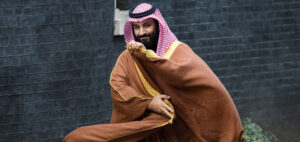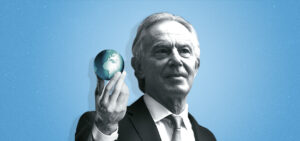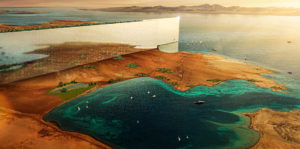Prior to the 1973 Arab oil embargo, nobody cared much for Saudi Arabia: a largely nomadic, pre-industrial desert nation with a population smaller than London. But in the last 50 years, it has become a friend worth cultivating. So much so that five years after the assassination of journalist Jamal Khashoggi, Western governments are welcoming Saudi Crown Prince Mohammed bin Salman back into the fold. This week, it emerged that Downing Street has invited him to visit Britain this autumn.
But the question remains: what does MBS want? At the heart of all Saudi foreign and domestic policy is the instinct to preserve the Al Saud dynasty. The monarchy has sought to achieve this in three ways: by providing security for the Saudi people, by promoting economic development, and by protecting Islam. Foreign policy has played an important role in meeting all three objectives.
Towards this end, King Salman and his son MBS have been racing to diversify the Saudi economy away from oil and bring its social policies more in line with global norms. Though this transformation plan, known as Vision 2030, clearly indicates a shift in tactics, the overall strategic objectives of Saudi foreign policy remain largely the same as ever.
Saudi foreign policy cannot be properly understood without a grasp of its volatile regional politics, characterised by hostility between Sunni and Shia Muslim states and, of course, the Arab-Israeli conflict. Saudi Arabia has borders with eight different nations and must defend two long coastlines with limited manpower. In previous decades, Egypt, Iraq, and Israel have stirred up trouble for the Saudis; today, the most likely threats come from Iran, Yemen and the likes of Al-Qaeda and Isis.
The Islamic Republic of Iran, an aggressive, terrorism-sponsoring regime, is an unfortunate neighbour to have. It has challenged Saudi interests in Iraq, Syria, Lebanon, and Yemen through the use of violent proxy forces such as Hezbollah and the Houthis, and its large missile forces sit within easy range of Saudi Arabia’s critical oil and desalination facilities. At times, it has even sought to delegitimise the Sunni Saudi administration of Mecca and disrupt the Hajj. But above all, many in Riyadh fear Tehran’s continuing efforts to enrich uranium.
Yemen, an impoverished country with a population nearly as large as Saudi Arabia, poses a whole other set of problems. Riyadh has long been concerned about drug and weapons smuggling out of the civil war-stricken country, as well as illegal immigration. But now it fears that Al Qaeda forces pushed out of Saudi Arabia have reestablished themselves in Yemen. On top of this, Houthi insurgents in the country, who are armed and funded by Tehran, and harbour irredentist claims to southern Saudi Arabia, are threatening to establish an Iranian-aligned government on its southern border.
Yet it was Al Qaeda, not Iran or Yemen, that has come closest to overthrowing the Saudi government. Between 2003 and 2007, Al Qaeda launched a terrorist campaign that killed dozens of Saudi citizens and more than 100 Saudi police officers. It targeted oil facilities, government offices, and even the American consulate in Jeddah where five employees were killed. The Saudis are determined not to let this happen again, doing its utmost to challenge Al Qaeda’s ideology and prevent the establishment of foreign training camps and operations bases.
Faced with such threats, where does diplomacy fit in? Throughout its history, Saudi Arabia has relied on powerful friends for support. It is unlikely the nation would ever have been established without British political, financial, and military support in the aftermath of the First World War. And since the Second World War, American support has proved vital, especially when Egypt threatened Saudi Arabia’s border in the Sixties, and when Iraq did the same in the Nineties. Likewise, British and American counterterrorism assistance helped to defeat Al Qaeda in the Arabian Peninsula.
Saudi foreign policy has also made astute use of its abundance of oil. No nation exerts greater influence on the price of oil — and therefore global energy prices — than Saudi Arabia, and it uses this to gain influence abroad. Not only has oil allowed this militarily-weak nation to maintain a global network of dependent customers, but its vast oil income means it can effectively distribute large amounts of cash to allies quickly and quietly. In their eyes, it is Riyadh’s ability to influence oil prices and finance its friends that has made it worth defending.
Yet oil money isn’t the only source of Saudi foreign influence: control over Mecca and Medina as well as the annual Hajj pilgrimage give it a unique position in the Muslim world. Like the Ottoman Sultans before them, Saudi kings have adopted the title Protector of the Two Holy Mosques, one of the most respected accolades in Islam. In the past, Saudi Arabia explicitly used religion to confront secular Arab nationalism in Egypt, Syria and Iraq, as well as during the atheist Soviet Union’s invasion of Afghanistan. Today, the Organisation of Islamic Cooperation, the Islamic Development Bank and the Muslim World League are all based in Saudi Arabia and are often used to promote its interests abroad.
When Salman bin Abdulaziz became King of Saudi Arabia in 2015, his mastery of diplomacy was immediately put to the test. At that time, the Arab world was in a state of chaos not seen since the 13th-century Mongol invasions: the continued existence of Lebanon, Libya, Syria and Yemen were in question; Isis had become the first terrorist organisation with its own capital city and oilfields, and Iran-backed Houthi insurgents had just seized Yemen’s capital of Sanaa and were on the verge of capturing the entire country.
Yet Saudi Arabia’s traditional foreign policy tools were in poor condition. The Saudi budget was deep in the red, with oil prices ending the year below $40 a barrel. And Riyadh was alarmed by the alacrity with which the Obama administration had abandoned Egypt’s President Hosni Mubarak to the Arab Spring and withdrawn from Iraq. Those decisions had handed one of Saudi’s neighbours over to the Muslim Brotherhood and the other to Isis and Iran. On top of that, King Salman’s plans to modernise the economy and reform its society had placed him at odds with many conservative religious scholars. All of this was made worse in 2018 when the assassination of Khashoggi turned MBS into a global pariah.
Over the past few years, King Salman and his son have sought to revive Saudi’s fortunes. They have not abandoned the three traditional principles of Saudi foreign policy, but they have, however, significantly changed how they rely on allies, influence energy markets, and promote Islam.
Most obviously, in an increasingly multipolar world, the Saudis have adopted a multi-partner foreign policy. For much of its history, the kingdom was firmly aligned with the West economically and politically. While those relations remain important, they are no longer exclusive. Today, China is the kingdom’s largest trading partner, and it is the Chinese who have more recently developed the kingdom’s railroads, ports and telecommunications networks. Last year, Riyadh and Beijing officially raised the level of their relations to that of strategic partnership.
Elsewhere, in an effort to increase their influence over global energy markets, the Saudis have created a new partnership with Russia known as Opec Plus. Saudi energy policy always seeks to keep oil prices as high as possible without driving its customers into recession or promoting the development of alternative energy sources. Now, their expanded cartel has brought together the world’s two largest oil exporters. It has allowed Saudi Arabia and Russia to weather the Covid crisis and maintain higher oil prices than either could have done individually. It has also allowed Saudi to effectively remain neutral in the Ukraine war: it has provided financial aid to Kyiv, but still purchased discounted Russian oil for its own use.
Finally, the version of Islam Saudi Arabia promotes has also shifted in recent years, becoming more tolerant of both other Muslims and other religions. At home, women can now drive and the religious police have largely disappeared. The sermons preached in Mecca have become less conservative and less anti-Shia, while rabbis and priests are allowed to quietly conduct their own services. Overseas, Saudi missionaries have become less active and less strident while Saudi charities have become much more tightly controlled.
The results of these tactical adjustments have been overwhelmingly positive. Doubting American resolve in deterring Iran’s nuclear ambitions, Riyadh has sought closer ties with Tehran, in a deal that was brokered by Beijing. As a result, the war in Yemen has largely come to an end, thus securing the kingdom’s southern border and freeing up resources for its economic development. The Saudi-Russian energy alliance, meanwhile, has clearly helped elevate oil prices, bolstering the sovereign wealth fund which has eroded the blowback from Jamal Khashoggi’s murder. Saudi relations with Iraq, Qatar, Pakistan, India and Turkey have all also improved, while security and economic relations with Israel have also quietly grown.
Ultimately, though, Riyadh has no intention of abandoning its close relations with the West, which remains the source of most of its military equipment. Just this month, Washington and Riyadh jointly sponsored a conference in Jeddah seeking to end the war in Ukraine. It is increasingly clear, however, that the Saudis are seeking to diversify their security relations. All the signs suggest that Saudi Arabia is following a more independent, Saudi-first foreign policy, one which doesn’t see any qualms with having Russia as a partner on the one hand, and Britain on the other.
Disclaimer
Some of the posts we share are controversial and we do not necessarily agree with them in the whole extend. Sometimes we agree with the content or part of it but we do not agree with the narration or language. Nevertheless we find them somehow interesting, valuable and/or informative or we share them, because we strongly believe in freedom of speech, free press and journalism. We strongly encourage you to have a critical approach to all the content, do your own research and analysis to build your own opinion.
We would be glad to have your feedback.
Source: UnHerd Read the original article here: https://unherd.com/





